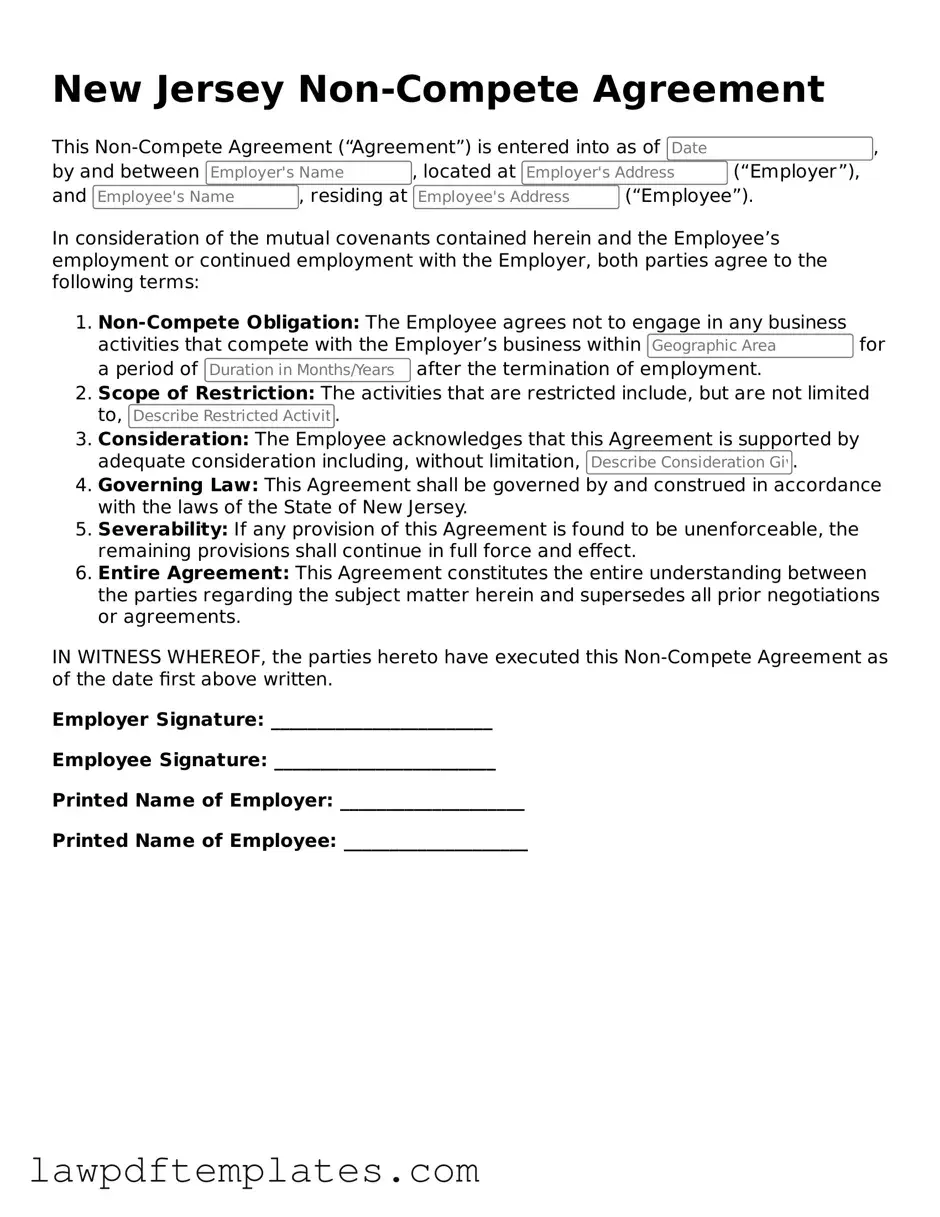Free Non-compete Agreement Template for the State of New Jersey
Form Breakdown
| Fact Name | Description |
|---|---|
| Governing Law | The New Jersey Non-compete Agreement is governed by New Jersey state law. |
| Enforceability | New Jersey courts will enforce non-compete agreements if they are reasonable in scope and duration. |
| Consideration Requirement | There must be valid consideration for the agreement, typically employment or continued employment. |
| Reasonableness Standard | Agreements must protect legitimate business interests and not impose undue hardship on the employee. |
| Duration Limits | While no specific duration is mandated, agreements that last too long may be deemed unreasonable. |
| Geographic Scope | The geographic area covered by the agreement must be limited to where the employer operates. |
Sample - New Jersey Non-compete Agreement Form
New Jersey Non-Compete Agreement
This Non-Compete Agreement (“Agreement”) is entered into as of , by and between , located at (“Employer”), and , residing at (“Employee”).
In consideration of the mutual covenants contained herein and the Employee’s employment or continued employment with the Employer, both parties agree to the following terms:
- Non-Compete Obligation: The Employee agrees not to engage in any business activities that compete with the Employer’s business within for a period of after the termination of employment.
- Scope of Restriction: The activities that are restricted include, but are not limited to, .
- Consideration: The Employee acknowledges that this Agreement is supported by adequate consideration including, without limitation, .
- Governing Law: This Agreement shall be governed by and construed in accordance with the laws of the State of New Jersey.
- Severability: If any provision of this Agreement is found to be unenforceable, the remaining provisions shall continue in full force and effect.
- Entire Agreement: This Agreement constitutes the entire understanding between the parties regarding the subject matter herein and supersedes all prior negotiations or agreements.
IN WITNESS WHEREOF, the parties hereto have executed this Non-Compete Agreement as of the date first above written.
Employer Signature: ________________________
Employee Signature: ________________________
Printed Name of Employer: ____________________
Printed Name of Employee: ____________________
Common mistakes
Filling out a Non-compete Agreement form in New Jersey can be a complex task. Many individuals make mistakes that can lead to misunderstandings or even legal issues down the line. Here are nine common errors to avoid.
One frequent mistake is failing to clearly define the scope of the agreement. A vague description of what constitutes competition can lead to confusion. It's important to specify the type of work or industry that the agreement covers. Without clarity, enforcing the agreement can become challenging.
Another error is not considering the geographic limitations of the agreement. Many people overlook the necessity of defining where the restrictions apply. If the area is too broad, it may be deemed unenforceable. A well-defined geographic scope helps ensure the agreement is fair and reasonable.
Some individuals forget to specify the duration of the non-compete clause. Leaving this out can create ambiguity. An agreement without a clear time frame may be viewed as overly restrictive, potentially leading to its invalidation.
Many also neglect to review the agreement with legal counsel. This step is crucial. Legal professionals can provide insights into the enforceability of the terms based on current laws and precedents. Skipping this step can result in overlooking important legal nuances.
Another common mistake is not considering the employee's role and responsibilities. The agreement should reflect the nature of the position. For example, higher-level positions may warrant stricter restrictions compared to entry-level roles. Tailoring the agreement to the specific job can enhance its validity.
Some individuals fail to communicate the terms of the agreement to the employee effectively. Clear communication is essential. If an employee does not fully understand what they are agreeing to, it can lead to disputes later on. Providing a thorough explanation can help mitigate misunderstandings.
Additionally, not including a severability clause can be problematic. This clause ensures that if one part of the agreement is found unenforceable, the rest remains intact. Without it, the entire agreement could be jeopardized if a single provision is challenged.
People often forget to keep a copy of the signed agreement. Documentation is key in any legal matter. Having a copy ensures that both parties are aware of the terms and can refer back to them if needed. This simple step can prevent disputes in the future.
Lastly, some individuals may use outdated templates or forms. Laws change, and using an old template can lead to issues. It’s important to ensure that the form being used is current and complies with New Jersey law.
By avoiding these common mistakes, individuals can create a more effective and enforceable Non-compete Agreement. A little attention to detail can go a long way in protecting both the employer's interests and the employee's rights.
Discover More Non-compete Agreement Templates for Specific States
Non Compete Agreement Florida Pdf - The legality of these agreements is often tested in court, particularly regarding their fairness.
For those looking to understand the importance of the Texas Vehicle Purchase Agreement, it is essential to know that this form provides clarity and legal protection for both parties involved in the transaction. By utilizing resources like PDF Documents Hub, buyers and sellers can ensure they have the correct documentation to facilitate a smooth and effective purchase process.
How to Get Out of a Non Compete Agreement - The form addresses how to handle violations of the agreement.
